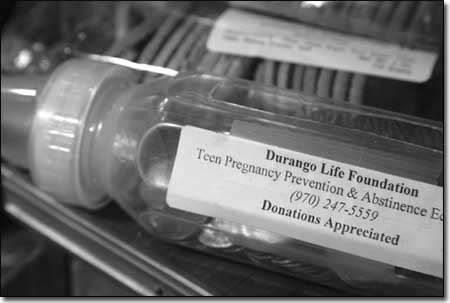|
 |
| A Durango Life Foundation fund-raising baby
bottle collects proceeds near the cash register in a downtown
Durango business recently./Photo by Todd Newcomer. |
W hen Durango resident Kelly Ryan first saw the baby bottle on the
counter of a local coffee shop last month, she figured it was a fund-raiser
for an infant in need of medical help. Upon closer inspection, she saw
the label was soliciting donations for "Teen Pregnancy Prevention & Abstinence
Education."
"It sounds so innocuous when you read it," Ryan says. "No
one wants pregnant teens, and abstinence is a good
thing to teach. I was shocked at the wording on the
bottle when I figured out it was coming from the 'abstinence-only'
perspective."
If "abstinence" is the common ground in the high voltage
arenas of sex education, birth control and family planning,
then "only" is the short that causes the spark. It
is the gulf that divides people who believe that knowledge
is power and those who believe that knowledge is dangerous.
"Abstinence-only is based in fear," Ryan, a student
teacher, continues. "We should put more faith in our
students to understand comprehensive sexual education.
What if abstinence doesn't work? Do we want them to
have no information?"
Ryan and a friend, Elizabeth Shank, talked to the
shop's owner about taking the bottle down. "We said,
as paying customers, that we were offended by the baby
bottle," said Shank. "Besides, if this group is receiving
all this money in federal grants, why do they need
to do fund raising?"
However, the bottle stayed, and Shank said that the
owner explained that the bottle was a way to bring
people together in a community forum to discuss the
issue. However, when the women asked if they could
counter by putting out brochures from Planned Parenthood
on safe sex, their request was denied.
"We were told we couldn't put our information on the
counter," she said.
A program called 'Reality'
Abstinence in the United States has become a bit of
a business over the last 20 years or so. Last week
marked the 20 th anniversary of Ronald Reagan's "Global
Gag Order." The policy, which was rescinded by President
Clinton and reinstated by George W. Bush, prohibits
U.S. dollars and contraceptive supplies from going
to
 |
Elizabeth Shank, left, and Kelly
Ryan
hold one of the baby bottles that have
been displayed in local establishments
by the Durango Life Foundation. Both
women are advocates for abstinence as
long as it’s in conjunction with other
prevention and safe sex
education./Photo by Todd Thompson. |
any international family planning program that provides
abortions or counsels women about their reproductive
health options. That opened the door for abstinence-only
family planning programs to rake in the grants. As
the policy emigrated home, abstinence-only education
grants became available to faith-based initiatives
around the country.
Colorado received $2.4 million in federal funding
for abstinence-only programs in fiscal year 2003. In
January, the Colorado Abstinence Education Program
awarded $407,000 to eight programs across the state,
with $64,890 going to the Durango-based Family Life
Center, the sponsors of the baby bottle. This equates
to $175 every day for a year.
Johnnye Hooper, executive director of the Family Life
Center, said the federal money "is to educate students
in the area with character-building qualities. The
program is called 'Reality.'"
Asked about the baby bottles, Hooper said they were "a
separate fund-raising project" for the Family Life
Center, an umbrella organization for a variety of groups
including the Pregnancy Center, which provides pregnancy
counseling opposed to abortion. She
said her group does not want to change local sex education
curriculum but that it continues to advocate representation
of its viewpoint in the schools.
Joelle Riddle, director of the Durango Planned Parenthood,
says that Planned Parenthood always emphasizes abstinence
first but takes issue when it is the only viewpoint
offered. "We have a common goal with the Pregnancy
Center to prevent unintended pregnancies and sexually
transmitted infections," she said. "The difference
is that we choose to educate not only on abstinence
but also to provide the tools of prevention."
Not surprisingly, this battle to win the hearts and/or
minds of teen-agers is a separate front in the endlessly
churning "pro-life/pro-choice" friction. After decades
of increasing influence in state and federal affairs,
the "abstinence-only" movement no longer portends moral
neutrality. If anything, the movement has expanded
the definition of abstinence to mean "abstinence-only-until-marriage," an
ever loftier goal.
Though it is agreed by all that teen-age abstinence
is a noble cause, young Hamlet might find it a custom
more honored in the breach than the observance. According
to the U.S. Center for Disease Control, somewhere between
40 percent and 50 percent of high school students report
sexual activity , thus the common
wisdom in high school sex education has been to hope
for the best and prepare for the worst.
Tools for prevention
Colorado State Law does not require sex education
in public schools, but it allows local districts to
offer it with two caveats: It shall give primary emphasis
to abstinence and parents can always opt their children
out. Durango School District 9-R has a required health
curriculum that devotes a total of six weeks to sex-ed,
two weeks each in sixth, eighth, and 10th grade.
"(The Family Center) has been told that the district
will not endorse any one program, but that they may
be invited to be guest speakers as part of a balanced
health curriculum just as teachers may invite Planned
Parenthood representatives to be guest speakers," said
District 9-R Public Information Director Deborah Uroda. "We
encouraged them to meet with principals and school
parent committees to make a presentation85 ."
The real sex-ed takes place at Durango High School
in 10th grade. The health class spends seven days covering
the reproductive system, sexually transmitted infections,
and conception and pregnancy. The teachers use guest
speakers to present different viewpoints on contraception
awareness and abstinence-only. Uroda said that in the
past, presentations have been made by both the Family
Center and Planned Parenthood.
This may be the only seven hours in the student's
life that people talk frankly about sex. According
to a 2002 Kaiser Family Foundation study, 80 percent
of Americans favor comprehensive sex education in the
schools, possibly because parents feel uncomfortable
teaching it in the home.
During an informal survey of six groups of local high
school students done for this story, all groups generally
agreed that abstinence-only education was all they
needed. However, most privately agreed that nonabstinence
education also is useful, and about a third wished
they had learned more. A select few remarked that sex-ed
was wrong or sucked. No one said they turned to their
parents for information, and several individuals reported
that oral sex was still abstinence.
"That's the problem," says Riddle. "They need age-appropriate
medically-accurate information. Without information,
they don't know that they can transmit infection. Adolescents
are not confused by more information. They can learn
about abstinence and also learn the tools they need
if they are not abstinent."
Meanwhile the word is out on the baby bottles. Megan
Klomps, a Planned Parenthood counselor, saw one in
her bank and arranged a meeting with the bank president. "They
were very receptive," Klomps said. "They had already
received a complaint from a nurse and agreed to remove
the bottle. It was a concern to me that they supported
abstinence only. It's important to have accurate information
available to everyone."
However, back at the coffee shop, Ryan and Shank have
been as yet unsuccessful in their campaign. Nor have
they succeeded in placing educational information nearby.
But they are not giving up. "You can't teach children
to 'Just Say No,'" said Shank. "You have to give them
more information and treat them like adults."
|